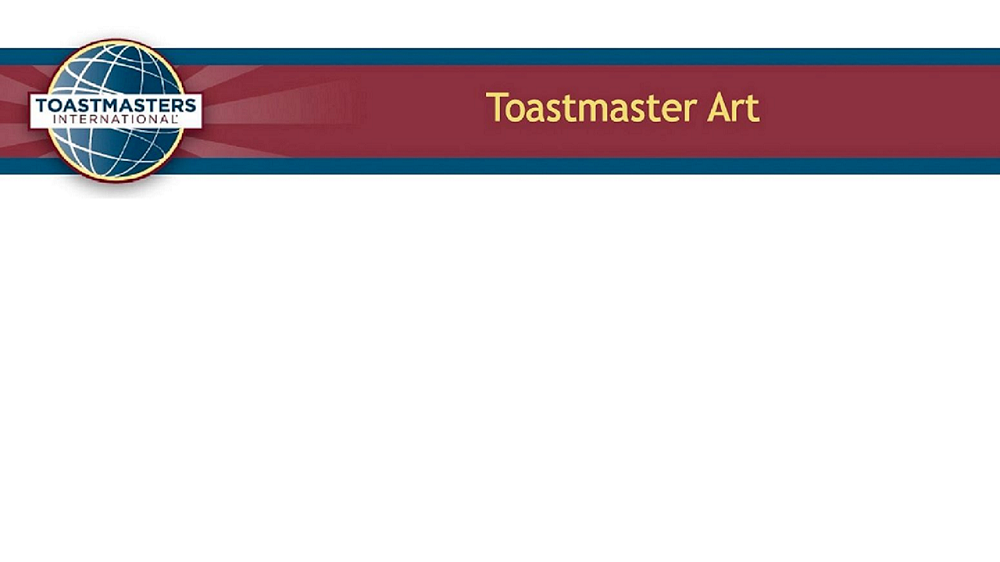We Toastmasters know what Table Topics is, how it helps participants improve their impromptu or extemporaneous speaking skills, and that a Table Topics speech, like any other, should ideally have a clear introduction, body, and conclusion (i.e. be structured). However, I have witnessed on many occasion the Topicsmaster, after introducing the session, simply asking for a volunteer. Sometimes one of the people who volunteers already has a major speaking role. Is this the best way to handle a Table Topics session, or can we do better?
Let’s first address the question “Do I call on people or ask for volunteers?” I have no recollection of ever in my time as a Toastmaster seeing an official resource which recommended solicitation of volunteers. If you examine the resources on the Topicsmaster role description page on the Toastmasters International Web site (https://www.toastmasters.org/membership/club-meeting-roles/topicsmaster), you will find “call on” in many places. The “Tackling the Topicsmaster Role” article linked from that page helps us further determine if calling on attendees or asking for volunteers is the way to go, by saying, “If you ask for volunteers, people who are shy may be reluctant to respond. And those who jump at the chance often need the least practice.” I have also noticed that when people are reluctant to volunteer to take a question there’s a delay that slows down the meeting and creates an uncomfortable awkwardness.
Great! We’ve seen that the Topicsmaster should call on attendees rather than asking for volunteers. We therefore now need to answer the question “Who do I call on?” I have a crack grammarian [Janet] in my club so I should note that “Upon whom do I call?” would be grammatically correct.
I developed a chart for use by the Topicsmaster. I have included it below so you can use it as the basis for a chart for your club. Bill Brown, in the article “Being the Best Table Topicsmaster” linked from the page above, has a multi-column list that he prepares. He also clearly states the rationale for the highest priority entry in my chart below being an “experienced member with no role (to demonstrate)” when he says, “Give them [guests] an opportunity to see how it is done before inviting them to participate.”
Prioritized list of people to call on for Table Topics
| Highest | Experienced member with no role (to demonstrate) |
| Willing guests | |
| Experienced members with report-only role (timer, ah counter, grammarian) or introductory role (quotemaster/tipmaster, jokemaster) | |
| Prepared speech evaluators | |
| General evaluator | |
| Toastmaster | |
| Prepared speakers | |
| Lowest | Table Topicsmaster |
In conclusion, whatever list or chart resource you prepare, make it available to all members (we keep ours on our club’s FreeToastHost site). Members, especially those serving for the first time as Topicsmaster, need to know that they should, 1) Call on people, and 2) Call on the right people in the right order. I believe that if you implement these recommendations, the Table Topics sessions in your club’s meetings will be the best they can be.


A more controversial and riveting article would address the selection of appropriate topics for discussion in Table Topics. This could lead into a discussion of who should be selected to address the topics. Article topics that lead to diverse opinions garner more attention.
I recall in my area director days being called up for Table Topics at one of the clubs I oversaw, and the question was so in-depth as to not be, I hope you would agree, “appropriate.” When we first consider the adjective “appropriate,” we likely consider if the thing might be deemed offensive to anyone, but in this context I believe it’s different. T.I. suggests that the Topicsmaster “Select topics that allow speakers to offer opinions” and that are “on non-specialized themes or topics.”
The question posed to me was, best I can recall, this: “You work for an animation company and you’ve been tasked to do thus and so. How would you handle the creation of a certain character?” Huh? Appropriate, or not?
BTW: my answer was quite clever.
This seems to be much the same as your other comment, which I hope to have satisfactorily answered. Thank you for posting!
An article addressing the selection of appropriate topics would be more of an attention getter. In addition this could also lead into the selection of speakers for table topics. A bit of controversy grabs people’ attention and interest
I have no doubt that you responded very cleverly to the table topic you detailed. I also appreciate your on-point response to my comment and agree that “appropriate” is the key word. The Irish clubs we visited in zoom had table topics that bordered on the controversial but ignited very thoughtful responses. They even addressed the pluses and minuses of capitalism. Some of our table topic questions, in my opinion, are too non-controversial. I apologize for the duplicate comments. I had a problem initially posting a comment.